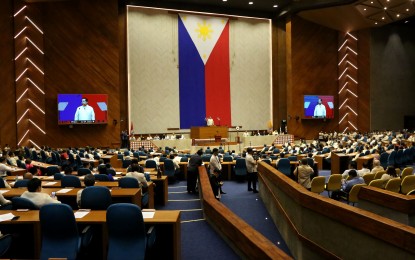
House of Representatives Session Hall (PNA file photo)
MANILA – A measure seeking to boost the capital markets and the investment competitiveness of the Philippines by reducing taxes for stock transactions has hurdled the final reading at the House of Representatives.
During Monday's plenary session, the chamber approved on the third reading House Bill (HB) 9277 or the proposed Capital Markets Efficiency Promotion Act, with 270 affirmative votes, three negative votes, and one abstention.
The measure seeks to amend the Tax Code by reducing taxes on stock transactions from 0.6 percent to just 0.1 percent of stock value and the tax on dividends of foreign non-residents from 25 percent to 10 percent.
The proposal also imposes a debt transaction rate of 0.1 percent, in parity with the reduced rate for stock transactions.
House Ways and Means Committee chair Joey Salceda, author of the measure, said the Philippines currently imposes the highest stock transaction levies among all major economies in the Association of Southeast Asian Nations (ASEAN).
“The Philippine Stock Exchange has the fewest listed companies of all ASEAN-6 economies, with just 275 listed companies, with the second lowest already being Singapore, with some 640 listed companies. Since the stock transaction tax was increased from 0.5 percent to 0.6 percent of transaction value, in 2019, the PSEi has declined by 29.83 percent," Salceda said.
This has adverse effects on the strength of the country’s pension and health insurance systems because the Social Security System (SSS) and the Philippine Health Insurance Corp. (PhilHealth) charters have strict investment policies that limit their equities exposure almost exclusively to Philippine index stocks, he added.
"If stocks don’t move in value, these funds also stagnate," he said.
Salceda pointed out that aside from the stock transaction tax, the high rate of tax on dividends received by foreign non-resident individuals also discourages foreign investors from buying Philippine stocks, which, in turn, prevents price discovery.
"As a result, Philippine stocks stagnate in value. In fact, monthly transaction volume continues to be lower than 2012 levels in peso terms. In dollar terms, it matches 2007 levels," he said.
He said the proposed reform would result in a revenue loss of PHP9.825 billion but could increase pension assets in the SSS and Government Service Insurance System (GSIS) alone by at least PHP72.9 billion.
The bill also proposes a provision to reduce the tax on winnings above PHP10,000 awarded by the Philippine Charity Sweepstakes Office (PCSO), as well as lotto winnings, to 10 percent from the current 20 percent. Winnings below PHP10,000 will be exempt.
The Documentary Stamp Tax (DST) on PCSO lottery tickets and horse race bets will also be reduced to 10 percent from the current 20 percent.
Bill allowing ICT infra in subdivisions, housing projects
The chamber also approved HB 9870 or the proposed Housing Development Digital Connectivity Act with 274 affirmative votes, zero negative votes, and no abstention.
To ensure digital connectivity in urban centers and populated areas of the country, the measure requires all housing projects, subdivisions, villages, or residential properties to allocate an area within its designated open space for the establishment of ICT infrastructure and related amenities.
It seeks to amend Presidential Decree (PD) 957, which mandates the developer of a subdivision to allocate open space for parks, playgrounds, and recreational use.
According to PD 957, as amended by PD 1216, for subdivision projects spanning one hectare or more, the owner or developer shall reserve 30 percent of the gross area for open space.
Developers can also provide an area for ICT infrastructure from the net saleable lots outside the mandatory 30 percent of the gross project area for open space to reserve the area for parks, playgrounds, and recreational use.
The ICT provider can obtain the area for ICT infrastructure and facilities through direct purchase based on the fair market value of the land or through a long-term lease.
All ICT infrastructure to be built in an existing subdivision shall be non-exclusive and shall be accessible for shared use by ICT providers.
The bill provides for compensation to the local government unit, the homeowners' association, the developer, or the private lot owner for the use of such open space. (PNA)
